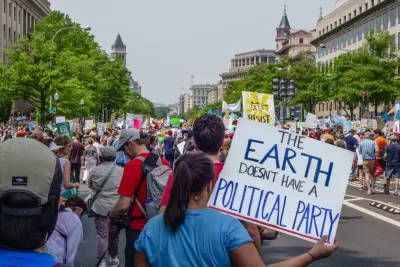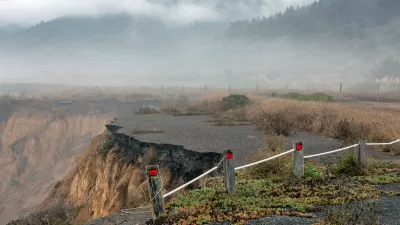Billions of people will have to relocate in the next decades. Are governments prepared?

As climate disasters make some parts of the world increasingly unlivable, billions of people — an estimated 3.5 billion by 2070 — will have to relocate to safer ground.
As Ayana Elizabeth Johnson explains in a piece for Wired, “To date, most climate migration has occurred within nations, but as the regions affected by extreme weather expand, that will need to change.”
We will have to be vigilant about keeping xenophobia at bay, acknowledging the cruel injustice at play as the lowest greenhouse gas emitting nations, like the Pacific islands, are the first to be inundated.
Johnson notes that governments at all levels are starting to take note, creating policies such as relocation buyouts and limiting new developments in risky areas. To prepare for relocating its residents once sea levels make the island unlivable, the government of the South Pacific nation of Kiribati purchased land in Fiji.
“Already, 11 percent of Americans have considered moving to avoid the impacts of global warming, and roughly 75 percent are hesitant to buy homes in areas with high climate risks like wildfires (more than 30 million homes in the lower 48 US states are at risk of being hit with wildfires).” Meanwhile, insurance companies are hiking rates or pulling out of certain areas altogether.
As Johnson points out, governments will need proactive policies to manage the climate migration that will become a fact of life. “It’s not that people want to move, to leave the communities and ecosystems they love and call home; it's that they must.”
FULL STORY: The Climate-Driven Diaspora Is Here

Planetizen Federal Action Tracker
A weekly monitor of how Trump’s orders and actions are impacting planners and planning in America.

Congressman Proposes Bill to Rename DC Metro “Trump Train”
The Make Autorail Great Again Act would withhold federal funding to the system until the Washington Metropolitan Area Transit Authority (WMATA), rebrands as the Washington Metropolitan Authority for Greater Access (WMAGA).

The Simple Legislative Tool Transforming Vacant Downtowns
In California, Michigan and Georgia, an easy win is bringing dollars — and delight — back to city centers.

The States Losing Rural Delivery Rooms at an Alarming Pace
In some states, as few as 9% of rural hospitals still deliver babies. As a result, rising pre-term births, no adequate pre-term care and "harrowing" close calls are a growing reality.

The Small South Asian Republic Going all in on EVs
Thanks to one simple policy change less than five years ago, 65% of new cars in this Himalayan country are now electric.

DC Backpedals on Bike Lane Protection, Swaps Barriers for Paint
Citing aesthetic concerns, the city is removing the concrete barriers and flexposts that once separated Arizona Avenue cyclists from motor vehicles.
Urban Design for Planners 1: Software Tools
This six-course series explores essential urban design concepts using open source software and equips planners with the tools they need to participate fully in the urban design process.
Planning for Universal Design
Learn the tools for implementing Universal Design in planning regulations.
Smith Gee Studio
City of Charlotte
City of Camden Redevelopment Agency
City of Astoria
Transportation Research & Education Center (TREC) at Portland State University
US High Speed Rail Association
City of Camden Redevelopment Agency
Municipality of Princeton (NJ)





























